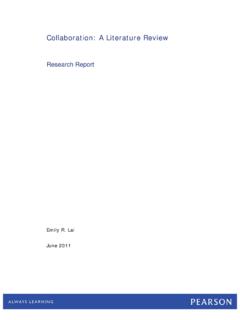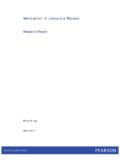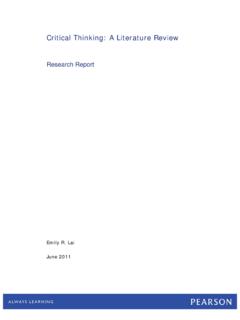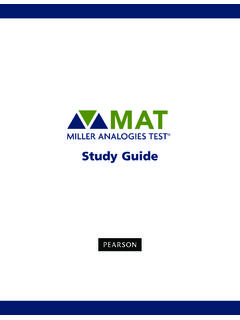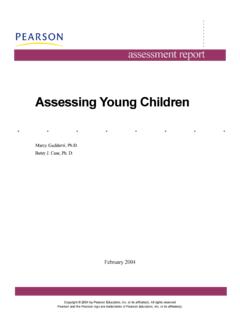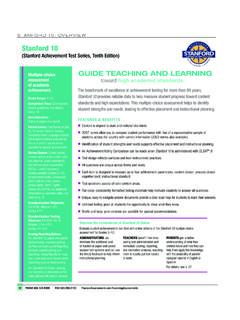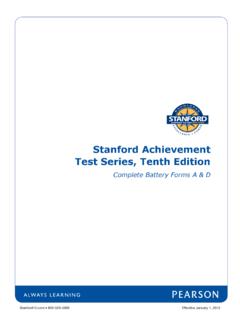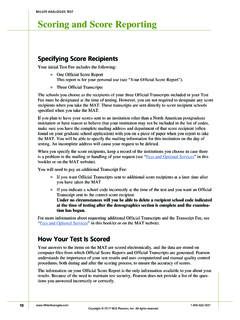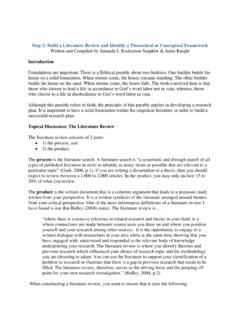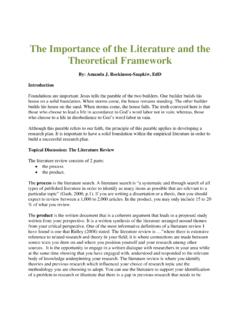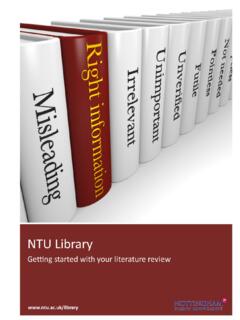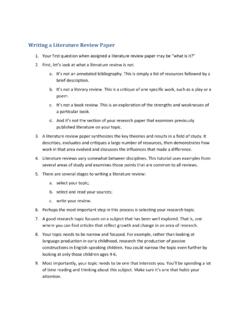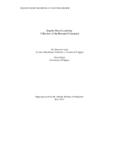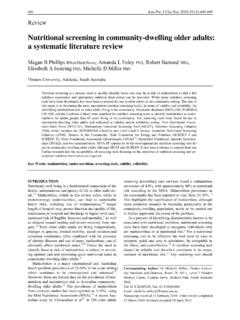Transcription of Metacognition: A literature review - Pearson Assessments
1 metacognition : a literature review Research Report Emily R. Lai April 2011. metacognition 1. About Pearson Pearson , the global leader in education and education technology, provides innovative print and digital education materials for preK through college, student information systems and learning management systems, teacher licensure testing, teacher professional development, career certification programs, and testing and assessment products that set the standard for the industry. Pearson 's other primary businesses include the Financial Times Group and the Penguin Group. For more information about the Assessment & Information group of Pearson , visit About Pearson 's Research Reports Pearson 's research report series provides preliminary dissemination of reports and articles prepared by TMRS staff, usually prior to formal publication.
2 Pearson 's publications in .pdf format may be obtained at: metacognition 2. Abstract metacognition is defined most simply as thinking about thinking. metacognition consists of two components: knowledge and regulation. Metacognitive knowledge includes knowledge about oneself as a learner and the factors that might impact performance, knowledge about strategies, and knowledge about when and why to use strategies. Metacognitive regulation is the monitoring of one's cognition and includes planning activities, awareness of comprehension and task performance, and evaluation of the efficacy of monitoring processes and strategies. Recent research suggests that young children are capable of rudimentary forms of metacognitive thought, particularly after the age of 3.
3 Although individual developmental models vary, most postulate massive improvements in metacognition during the first 6 years of life. metacognition also improves with appropriate instruction, with empirical evidence supporting the notion that students can be taught to reflect on their own thinking. Assessment of metacognition is challenging for a number of reasons: (a) metacognition is a complex construct; (b) it is not directly observable; (c) it may be confounded with both verbal ability and working memory capacity; and (d) existing measures tend to be narrow in focus and decontextualized from in- school learning. Recommendations for teaching and assessing metacognition are made.
4 Keywords: metacognition , self-regulated learning metacognition 3. Acknowledgements The author would like to thank Janet Fowler for assistance in conducting literature searches and the following reviewers for their helpful comments and suggestions on an earlier draft of this paper: Jennifer Beimers, Bob Dolan, and Cip Mu oz. metacognition 4. metacognition : a literature review Educational psychologists have long promoted the importance of metacognition for regulating and supporting student learning. More recently, the Partnership for 21st Century Skills has identified self-directed learning as one of the life and career skills necessary to prepare students for post-secondary education and the workforce.
5 However, educators may not be familiar with methods for teaching and assessing metacognition , particularly among elementary- aged children. The purpose of this literature review is fourfold: (1) to explore the ways in which metacognition has been defined by researchers; (2) to investigate how metacognition develops in young children; (3) to learn how teachers can encourage development of metacognitive skills in their students; and (4) to review best practices in assessing metacognition . Definition of metacognition John Flavell originally coined the term metacognition in the late 1970s to mean cognition about cognitive phenomena, or more simply thinking about thinking (Flavell, 1979, p.)
6 906). Subsequent development and use of the term have remained relatively faithful to this original meaning. For example, researchers working in the field of cognitive psychology have offered the following definitions: The knowledge and control children have over their own thinking and learning activities (Cross & Paris, 1988, p. 131). Awareness of one's own thinking, awareness of the content of one's conceptions, an active monitoring of one's cognitive processes, an attempt to regulate one's cognitive processes in relationship to further learning, and an metacognition 5. application of a set of heuristics as an effective device for helping people organize their methods of attack on problems in general (Hennessey, 1999, p.
7 3). Awareness and management of one's own thought (Kuhn & Dean, 2004, p. 270). The monitoring and control of thought (Martinez, 2006, p. 696). As Kuhn and Dean (2004) explain, metacognition is what enables a student who has been taught a particular strategy in a particular problem context to retrieve and deploy that strategy in a similar but new context. The authors note that in cognitive psychology, metacognition is often defined as a form of executive control involving monitoring and self-regulation, a point echoed by other researchers (McLeod, 1997; Schneider & Lockl, 2002). Further, Schraw (1998). describes metacognition as a multidimensional set of general, rather than domain-specific, skills.
8 These skills are empirically distinct from general intelligence, and may even help to compensate for deficits in general intelligence and/or prior knowledge on a subject during problem solving. Constituent Elements of metacognition metacognition has two constituent parts: knowledge about cognition and monitoring of cognition (Cross & Paris, 1988; Flavell, 1979; Paris & Winograd, 1990; Schraw & Moshman, 1995; Schraw et al., 2006; Whitebread et al., 1990). Several frameworks have been developed for categorizing types of knowledge about cognition. Table 1 organizes components from each of these frameworks to facilitate comparisons among them. For example, Flavell (1979) defines cognitive knowledge as knowledge about one's own cognitive strengths and limitations, including the factors (both internal and external) that may interact to affect cognition.
9 He classifies such knowledge into three types: (1) person knowledge, which includes anything one metacognition 6. believes about the nature of human beings as cognitive processors; (2) task knowledge, which includes knowledge about the demands of different tasks; and (3) strategy knowledge, which is knowledge about the types of strategies likely to be most useful. Flavell notes that these different types of knowledge can interact, as in the belief that one should use strategy A (versus strategy B) to solve task X (rather than task Y). metacognition 7. Table 1. Typology of Metacognitive Components Metacognitive Type Terminology Citation Component Person and task Flavell, 1979.
10 Knowledge Knowledge about Self-appraisal Paris & Winograd, 1990. oneself as a learner and Epistemological Kuhn & Dean, 2004. factors affecting understanding cognition Cross & Paris, 1988. Declarative Schraw et al., 2006. knowledge Cognitive Schraw & Moshman, 1995. knowledge Awareness and Cross & Paris, 1988. Procedural management of Kuhn & Dean, 2004. knowledge cognition, including Schraw et al., 2006. knowledge about Strategy Flavell, 1979. strategies knowledge Knowledge about why Conditional and when to use a given Schraw et al., 2006. knowledge strategy Cross & Paris, 1988. Identification and Paris & Winograd, 1990. selection of appropriate Planning Schraw et al.
